Keith Ratzlaff would like some answers. Or perhaps he would like a world that didn’t need so much explaining. This collection of anecdotes and meditations, despite not being dramatically questioning, still seem to present the ghost of “I don’t know why, do you?” From stories of misbehaving, fighting relatives to portraits of paintings in Amsterdam, a current of surprise runs through the plain text and action that reminds us that there are things worth knowing before we pass judgment on our neighbors. Continue reading “Then, a Thousand Crows”
NewPages Blog
At the NewPages Blog readers and writers can catch up with their favorite literary and alternative magazines, independent and university presses, creative writing programs, and writing and literary events. Find new books, new issue announcements, contest winners, and so much more!
Then, a Thousand Crows
Spread the word!
A Disposition for Shininess
In Arisa White’s debut collection, A Disposition for Shininess, family eclipses mere flesh and blood. Siblings are a unit that both torture and uplift one another, come what may in the strange universe of adults. White’s observations of family dynamics gain interpretive momentum as the reader progresses through this slim volume of nine poems. Continue reading “A Disposition for Shininess”
Spread the word!
Drift and Swerve
Drift and Swerve, Samuel Ligon’s second book and winner of the 2008 Autumn House Press Fiction Prize, takes its title from the second piece in the collection, a road trip story about a family traveling behind a drunk driver as they return home after visiting their dying grandmother. While the family bickers, the drunk driver grows more erratic, weaving across the road, first lazily and then desperately, before wrecking the car into an enormous concrete ditch. Each family member reacts differently to the nearly fatal accident: the mother cradles the injured drunk’s head against her body to comfort him; the father weakly stands to the side with a blanket, pretending to offer help; and the children, disappointed because the man is not dead, go sliding through the mud “as if it were winter and the drainage ditch a frozen over river.” Continue reading “Drift and Swerve”
Spread the word!
Story South Remake and Million Writers
storySouth is up and running with a new look after a brief reshuffling hiatus, which is a relief to see considering how many magazines I’ve seen go on hiatus and never return: “Online fads can’t help but fade away; great writing endures. storySouth is all about the writing.”
storySouth is indeed back with new content for spring, and the Million Writers Award stories are now online. The top ten will be selected and available for public vote starting May 15, and thanks to some generous donors, it looks as though the prize pot is healthy.
Spread the word!
Contest for Booksellers
Unbridled Books and NetGalley announce a contest inspired by author Emily St. John Mandel and our bookseller partners. We want to encourage booksellers to read e-galleys, and to make this possible, we are offering a SONY Reader to the three booksellers who craft the best handselling pitches for Mandel’s debut novel, Last Night in Montreal(pub. date June 2). The contest runs from May 1, 2009 through midnight on June 1, 2009.
Spread the word!
Poets Respond to Art
Each month, TATE ETC. (“Europe’s largest art magazine”) publishes new poetry by leading poets such as John Burnside, Moniza Alvi, Adam Thorpe, Alice Oswald and David Harsent who respond to works from the Tate Collection. This April, Elaine Feinstein presents her poem, Isaac Babel Riding with Budyonny, based on R.B. Kitaj’s work of the same name. This work is not currently on display in Tate galleries, but Erasmus Variations by the same artist is on display in Tate Britain, and Isaac Babel Riding with Budyonny can be viewed on the Tate Collection online.
Spread the word!
Writer in Residence UL Lafayette
University of Louisiana at Lafayette accepting applications for Writer-in-Residence and Professor/Associate Professor of English. Tenure-track position, beginning Fall 2009. Creative Writing-Fiction.
Duties: teaching one Creative Writing workshop per academic year, directing dissertations and theses, working with graduate and undergraduate students in creative writing, presenting at least one public reading or lecture each year, and participating in the department and university community. Continued publishing in field and other duties associated with holding a university position.
Qualifications: International reputation as a creative writer as evidenced by awards and publications in prestigious international venues, extensive publications in creative genres (fiction, poetry, drama, creative non-fiction), professional experience in teaching advanced Creative Writing workshops.
Send application letter, current CV, and names and addresses of three references to Professor James McDonald, Department Head, Department of English, University of Louisiana at Lafayette, P. O. Box 44691, Lafayette, LA 70504.
Spread the word!
Week 1: Reading is Stoopid
Just in time for some end-of-semester humor – check out Robert Lanham’s Internet-Age Writing Syllabus and Course Overview for ENG 371WR: Writing for Nonreaders in the Postprint Era on McSweeney’s.
Spread the word!
WSJ’s Take on E-Reading
How the E-Book Will Change the Way We Read and Write
“Author Steven Johnson outlines a future with more books, more distractions — and the end of reading alone”
Spread the word!
Awards :: Narrative Winter Short Story Contest
Narrative Magazine 2009 Winter Short Story Contest Winners:
FIRST PRIZE
Janet Burroway “White Space”
SECOND PRIZE
Adam Atlas “New Year’s Weekend on the Hand Surgery Ward, Old Pilgrims’ Hospital, Naples, Italy”
THIRD PRIZE
David Bradley “That Ain’t Jazz”
The Spring Story Contest, with a First Prize of $3,250, a Second Prize of $1,500, a Third Prize of $750, and ten finalists receiving $100 each, is open to fiction and nonfiction entries from all writers. Entry deadline: July 31.
The First Annual Poetry Contest, with a First Prize of $1,500, a Second Prize of $750, a Third Prize of $300, and ten finalists receiving $75 each, is open to poetry from all writers. Contest dates: May 23 to July 18.
Spread the word!
The World Lit Conundrum
A recent article in Rueters looks at unsuccessful efforts by the Chinese literary culture to have their works considered abroad. Lack of background knowledge to fully be able to understand/appreciate the works as well as lack of English translators are cited as a couple reasons for this continued struggle. What books do get recognized? Mostly those which are banned in China; not necessarily the strongest examples of Chinese literature, but they get the translations and readership because of the controversy. Though, if the US is still showing a decline in readership for its own literature, what hope do other countries have in finding recognition here?
And an interesting counter or alter-perspective to this article is “Author, Author: The World of ‘world’ Literature” in which Pankaj Mishra comments on “literary cosmopolitanism” – in relation to Karl Marx and Susan Sontag (of all pairings) – and the rise of India as a force in the book world: “Cultural palates in this flattened world can only be progressively homogenised. Whether attempting social or magical realism, literary writers also become increasingly subject to market realism.”
Spread the word!
Failbetter’s Got Alexie
Along with weekly installations of poetry, stories, multimedia, and whatever else fancies their tickle, Failbetter has an interview with Sherman Alexie in their Spring issue.
Spread the word!
Awards :: Glimmer Train Very Short Fiction
Glimmer Train has just chosen the winning stories for their February Very Short Fiction Award. This twice yearly competition is open to all writers for stories on any theme, with a word count range of 500-3,000.
First place:Rolaine Hochstein of New York, NY, wins $1200 for “Virtuous Woman”. Her story will be published in the Summer 2010 issue of Glimmer Train Stories, out in May 2010.
Second place: Anne de Marcken of Olympia, WA, wins $500 for “Best Western”. Her story will also be published in an upcoming issue of Glimmer Train Stories, increasing her prize to $700.
Third place: Evan Christopher Burton of New York, NY, wins $300 for “Levitation”.
Also: Family Matters competition (deadline soon approaching! April 30)
Glimmer Train hosts this competition quarterly, and first place is $1,200 and publication in the journal. It’s open to all writers for stories about family. Word count range 500-12,000.
Spread the word!
Court Green – 2009
The best part of Court Green, published annually by Columbia College of Chicago, is always the “Dossier,” featuring a special topic or theme. And this year’s, “Letters,” is my favorite so far. Whatever the reason – because letter-writing is, in its essence, about the printed word; or because so many of us have some things we can imagine saying to so many people; or because people who love to write and are, by profession, proficient at it, are also, naturally, great letter-writers – these “letter poems” make for extremely inventive and entertaining reading. Continue reading “Court Green – 2009”
Spread the word!
The Florida Review – Winter 2008
In her entertaining and highly original Editors’ Note, Jocelyn Bartkevicius says at The Florida Review they’ve been “arguing over what counts as truth.” If names in the Table of Contents don’t make you eager to read the journal (Maureen P. Stanton, Baron Wormser, Tony Hoagland, Denise Duhamel, Michel Burkard, an interview with Terese Svoboda), the editor’s creative consideration of what constitutes fact checking, whether or not authors get to define the genres of their work, and the meaning of “truth” in these post James Frey Debacle times (as the Review’s staff refers to them) surely will. Continue reading “The Florida Review – Winter 2008”
Spread the word!
Fugue – Summer-Fall 2008
Mark Halliday, judge for the journal’s annual poetry contest, describes the winning poems as “ready to…confront contradictions,” “avoid dumb enthusiasm,” and provide “neatly managed endings,” which serves equally well to describe Fugue’s editorial approach, and it’s one of the reasons I’ve always liked the magazine. I appreciate Halliday’s winning choices, poems by Lisa Bellamy, David J. Corbett, and Carol Louise Munn, three distinctly different examples of what it takes to make a poem, but all “strikingly alive,” as Halliday says, and all more emotionally charged and more satisfying than they appear on a first reading. These poems tell stories more moving and more complex than their language, at first, seems to imply. Bellamy, in particular, is both clever and tender, a combination of tones that can be difficult to pull off. Continue reading “Fugue – Summer-Fall 2008”
Spread the word!
Green Mountains Review – 2009
The theme of this all-fiction issue is shame and glory, “which seemed a marvelously arbitrary way to come across good stories,” writes Leslie Daniels in her introduction to the issue. “As writers, shame set us wildly in motion. And glory is . . . transformation, the alchemy involved in making art,” she concludes. Continue reading “Green Mountains Review – 2009”
Spread the word!
J Journal – Fall 2008
J Journal takes a journey to the dark side of humankind – the criminal side, the enforcement side, to those who have been brutalized, taken advantage of…it uses literature to pose “questions of justice, directly and tangentially.” Each poem, each short story brings a situation laden with irony, and leaves it unresolved, leaving the reader to search within, find the discordant inner chord that has been struck and bring it back into tune. Continue reading “J Journal – Fall 2008”
Spread the word!
Mid-American Review – Spring 2009
The annual Fineline Competition issue is always one of my favorites. The contest is open to entries of prose poetry, sudden fiction or non-fiction, or other “literary work that defies classification” (500 words or less). There’s a kind of freedom in the “sudden” form that seems to bring out the best in writers of all types. This year’s first-place winner is MFA student Ryan Teitman who creates a little museum of oddities, “The Cabinet of Things Swallowed,” that ends in a surprise or, more accurately, in the promise of a surprise. It’s the sense of promise that I appreciate most in these short works. Take, for example, the start of J.L. Conrad’s “Meanwhile,” one of the Editor’s Choice winners: “My dreams inscribe for me a world in which.” Or Editor’s Choice winner Alan Michael Parker’s opening line in “Our New System of Government”: “We believe we were misinformed.” The editors received nearly 2,000 submissions for the contest. I’m clearly not the only one who appreciates the form. Continue reading “Mid-American Review – Spring 2009”
Spread the word!
Naugatuck River Review – Winter 2009
Starting a new publication, especially “in times like these” (TM), is a cause for congratulation, so here’s celebrating the debut of Naugatuck River Review, “a journal of narrative poetry that sings.” (Shouldn’t all poetry?) The “narrative” label may bring to mind first person nature encounters and bittersweet childhood memories, and NRR contains its share. The real pleasures, though, are the memorable characters, the people whose lives show up in small glimpses between the lines. We meet a sawmill worker whose retirement ceremony belies his rough-and-tumble life, a bar patron who learns to resist being treated as an object and authors her own adventure, and a cross dresser who tries too hard to impress. Continue reading “Naugatuck River Review – Winter 2009”
Spread the word!
The Ne’er-Do-Well – 2009
More props are in order for the inaugural issue of this Portland prose journal. The Ne’er-Do-Well carries itself like a zine, an enfant terrible sneering at the establishment as all rejected writers in tiny presses are wont to do. Founder Sheila Ashdown explains that her intention was to encourage writers struggling with doubt. To keep writing, she says, “requires a high threshold for psychic pain and awkward conversation.” Continue reading “The Ne’er-Do-Well – 2009”
Spread the word!
Notre Dame Review – Winter/Spring 2009
This issue’s theme is “bridges and views,” introduced by a stunning and unusual cover photo that merges beautifully the concept of bridge and view – the relationship of structure to perspective. The image does not have the appearance of stock photography, though I was unable to find a reference to the photographer. These are, of course, rich, provocative, and perhaps even favorite topics for artists from all disciplines and genres. Continue reading “Notre Dame Review – Winter/Spring 2009”
Spread the word!
Quarter After Eight – 2009
Quarter After Eight publishes prose-poems, short-short fictions, essays in-brief, etc., all of which must be contained within 500 words or less. The highlighted criterion encourages an “innovative address to the prose form…dedicated to blurring the traditional lines of prose and verse.” This issue features 28 short pieces including the 2008 Robert J. DeMott Short Prose Contest winners, with First Place going to Cynthia Reeves for “Naming the Dead.” As stated in a preface by contest judge Sean Thomas Dougherty, Reeves manages “In barely a page…[to] offer us [an] elegy for the loss of a friend, the gaining of sexual knowledge, and the subsequent hurt that follows years later through the ghost of memory.” “Naming the Dead” is so beautifully rendered it’s difficult to decide if its lines should be quoted in prose or verse, such as in the following: Continue reading “Quarter After Eight – 2009”
Spread the word!
NewPages Updates :: Contest Pages & YA Page
I’ve been updating! The Writing Contests pages have a number of new entries – click by and take a look.
NewPages lists *quality* contests on our site. These are contests sponsored by or connected with publications, presses, and colleges/universities listed in our guides. If you find incorrect information, a missing link, or have a contest you would like considered for listing please let me know.
Should you have a problem with a contest we list, notify me immediately. Contest sponsors who behave badly will promptly be removed.
Writing Contests
For individual works of all types.
Book Contests
For full-length manuscripts as well as already published books.
There is a separate listing for contests of interest to Young Authors (K – early college). This also includes links to YA publications and information about how to submit works as well as avoiding contest scams: New Pages Young Authors Guide
Spread the word!
DOXA FIlm Fest
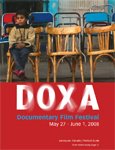 DOXA
DOXA
Documentary Film Festival
Vancouver, CA
May 22nd – 31st, 2009
DOXA is presented by the Documentary Media Society, a Vancouver based non-profit, charitable society (incorporated in 1998) devoted to presenting independent and innovative documentaries to Vancouver audiences. The society exists to educate the public about documentary film as an art form through DOXA – a curated and juried festival comprised of public screenings, workshops, panel discussions and public forums.
Spread the word!
Free Mags for Teachers :: Geist
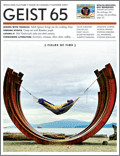 The Goods
The Goods
“Geist is delivering the best Canadian writing to classrooms from Tatamagouche to Victoria, from high school to grad school, from creative writing to English composition. Four times a year we publish fiction, life writing, essays, poetry, comix, rants, photo essays and unclassifiable dispatches — a cornucopia of genres and styles for teachers and students of writing.”
The Deal
“We send you a free class set of Geist.
We post free lesson plans that you can use in the classroom.
That’s it! No strings, no sales, no spam.”
The Agenda
“Geist is always looking for new writers and readers.
Writing teachers are always looking for new teaching ideas and opportunities for emerging writers.
Geist in the Classroom puts us together.”
Spread the word!
Film :: War Rug
“War Rug is a work of documentary poetics in the form of a book length poem. Multiple interwoven narratives explore life within zones of conflict as viewed through the lens of current warfare. The narratives range from passages inspired by journal entries, firsthand accounts, and news reports to poetic constructs collaged from military doctrine, Freedom of Information Act released government documents (like CIA interrogation manuals, and detainee autopsy reports), and numerous other sources.” (Poet, translator, and new media artist Francesco Levato is the executive director of The Poetry Center of Chicago.)
Spread the word!
Allied Media Conference
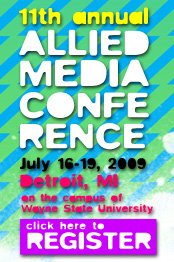 11th Allied Media Conference
11th Allied Media Conference
“We Are Ready New: Media and creativity to transform our selves and our world”
July 16-19, 2009
Detroit, Michigan
The 11th AMC will advance our visions for a just and creative world. It will be a laboratory for media-based solutions to the matrix of life-threatening problems we face. For the past 10 years, we have evolved our definition of media, and the role it can play in our lives – from zines to video-blogging to breakdancing, to communicating solidarity and creating justice. Each conference builds off the previous one and plants the seeds for the next. Ideas and relationships evolve year-round, incorporating new networks of media-makers and social justice organizers. The 2009 AMC will draw strength from our converging movements to face the challenges and opportunities of our current moment.
Spread the word!
NEA Overlooks Narrative Nonfiction
And Lee Gutkind has something to say about it on The Voice of Creative Nonfiction.
Spread the word!
Scholarly Journals :: Works and Days
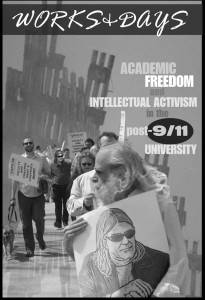 Published by the English Department at the Indiana University of Pennsylvania, Works and Days provides a scholarly forum for the exploration of problems in cultural studies, pedagogy, and institutional critique, especially as they are impacted by the transition from print to electronic environments. Each issue of the journal is organized around specific inquiries conducted as shared disciplinary or postdisciplinary research projects. Works and Days aims to serve not only as a forum for collaborative research and teaching, but also as an environment in which mutual inquiries may flourish.
Published by the English Department at the Indiana University of Pennsylvania, Works and Days provides a scholarly forum for the exploration of problems in cultural studies, pedagogy, and institutional critique, especially as they are impacted by the transition from print to electronic environments. Each issue of the journal is organized around specific inquiries conducted as shared disciplinary or postdisciplinary research projects. Works and Days aims to serve not only as a forum for collaborative research and teaching, but also as an environment in which mutual inquiries may flourish.
Issues include:
Academic Freedom and Intellectual Activism in the Post-9/11 University
v26-27, 2008-2009
The Society for Critical Exchange–Phase 1: 1975-1988
v25, 2007
Intellectual Intersections: Ethnic and Racial Crossings
v24, 2006
Richard Ohmann: A Retrospective
v23, 2005
Capitalizing on Play: The Politics of Computer Gaming
v22, 2004
Spread the word!
Who’s New at the Academy?
The American Academy of Arts and Letters will hold its annual induction and award ceremony on Wednesday, May 20, 2009. President of the Academy, McClatchy stated, “The Academy is proud to welcome to its ranks these distinguished new members. It’s an eclectic group of exceptional individuals—each a pioneer of the imagination and an artist of resplendent gifts and achievements.”
Nine members will be inducted into the 250-person organization: artist Judy Pfaff and architect Tod Williams; writers T. Coraghessan Boyle, Jorie Graham, Yusef Komunyakaa, and Richard Price; composers Stephen Hartke, Frederic Rzewski, and Augusta Read Thomas.
Academician Louise Glück will deliver the Blashfield Foundation Address, titled “American Originality.” An exhibition of art, architecture, books, and manuscripts by new members and recipients of awards will be on view at the Academy’s galleries from May 21 to June 14, 2009.
Spread the word!
Teachers on Twitter
Laura Walker has some tips for educators getting started on and using Twitter for professional development and networking, as well as regular Twitter updates on her blog.
Spread the word!
They’re Here!
Spread the word!
National Magazine Award Finalists
The American Society of Magazine Editors has announced the 2009 National Magazine Awards Finalists. Congratulations to literary magazines Antioch, The Virginia Quarterly, The American Scholar, and The Paris Review who made the list!
Spread the word!
Passings :: James D. Houston
 James D. Houston, author of Snow Mountain Passage, Continental Drift and, with his wife, Farewell to Manzanar, died on April 16 as a result of complications from cancer. He was 75.
James D. Houston, author of Snow Mountain Passage, Continental Drift and, with his wife, Farewell to Manzanar, died on April 16 as a result of complications from cancer. He was 75.
Spread the word!
Comics Archive Online
New at the University of Nebraska-Lincoln library: Government Comics Collection. With nearly 200 entries, there’s a wide range of content – from Fighting Apartheid to The True Story of Smokey the Bear. All are available full-text pdf.
Spread the word!
Forgotten Pulitzers
Before adding a new author to the list of winners, AbeBooks has compiled a list of “forgotten winners of the Pulitzer Prize for Fiction and the Pulitzer Prize for the Novel as the award was known prior to 1948.” Winning does not secure lasting fame, or even books that can still be found on the shelf, as the price of some of these out-of-print editions will show.
Spread the word!
New Lit Mag Reviews Posted
NewPages Literary Magazine Reviews for April 18 include The Antioch Review :: The Chaffin Journal :: ChiZine :: Eclectica :: The Farallon Review :: Journal of Ordinary Thought :: Manoa :: The Missouri Review :: storySouth :: The Sun :: Tuesday
Spread the word!
Novelists Need to Write More in the Now
Amanda Craig argues that “Contemporary novelists are so busy writing about the past, they’re neglecting the times they live in.” Her article “Stuck in the past: Why is modern literature obsessed with history?” in The Independent considers the responsibility of novelists to represent and comment on their own time, the difficulty of the task, and the risks associated with public response that need to stop being avoided.
Spread the word!
Passings :: Eve Sedgwick
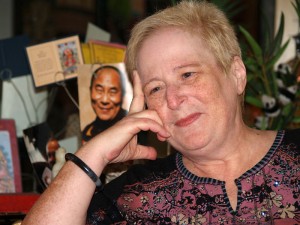 Educator, Author Eve Kosofsky Sedgwick Dies at 58
Educator, Author Eve Kosofsky Sedgwick Dies at 58
By Advocate Writer Michelle Garcia
Eve Kosofsky Sedgwick, a prominent theorist who is often cited as one of the founders of queer theory, died on April 12. She was 58.
Sedgwick was reportedly diagnosed with breast cancer in 1991, prompting her book A Dialogue on Love. Sedgwick taught English at several institutions including Boston University; the University of California, Berkeley; and Duke University, where she was a Newman Ivey White Professor of English.
Sedgwick has written many books on gender and sexual orientation, including Between Men: English Literature and Male Homosocial Desire; Epistemology of the Closet; and Tendencies.
Spread the word!
Documentary :: Ferlinghetti
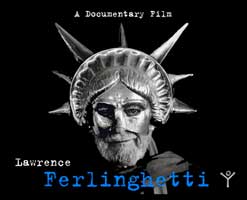 Lawrence Ferlinghetti turned 90 last month, and this month will see the premiere of a documentary about Ferlinghetti’s life and work on April 28 at the San Francisco International Film Festival.
Lawrence Ferlinghetti turned 90 last month, and this month will see the premiere of a documentary about Ferlinghetti’s life and work on April 28 at the San Francisco International Film Festival.
Director Christopher Felver crafts an incisive, sharply wrought portrait that reveals Ferlinghetti’s true role as catalyst for numerous literary careers and for the Beat movement itself. The film features archival photographs and historical footage, with appearances by Allen Ginsberg, Michael McClure, Billy Collins, Dennis Hopper, Robert Scheer, Dave Eggers, and Pulitzer Prize winner Gary Snyder. The appearance of numerous other prominent figures from the literary, political, and art community further underscores the enormous social impact Ferlinghetti’s legacy continues to have on the American cultural scene.
Spread the word!
Book Cover Banquet
With (currently) over 1000 images, The Book Cover Archive presents “An Archive of Book Cover Designs and Designers for the Purpose of Appreciation and Categorization.” You can browse all, or refine to browsing to full alpha lists of designers, titles, authors, art directors, photographers, illustrators, genres, publication date and publishers. Thanks for the feast goes to Ben Pieratt and Eric Jacobsen who edit and maintain The Book Cover Archive.
Spread the word!
WoC Media Collective: SPEAK!
SPEAK! Women of Color Media Collective is a netroots coalition of media-makers interested in strengthening our communities through truth-telling, media justice and the creation of a network of women of color media makers.
SPEAK! members blend together personal experience with an intersectional [includes everyone] multi-issue feminist perspective. SPEAK! members believe in media that is for our communities, by our communities. The framework SPEAK! uses is the one created by earlier feminists of color: a life-long commitment to addressing interlocking forms of oppression by creating radical transformative relationships to each other and the world.
In addition to a zine of poetry, lyrics, and art, SPEAK! has produced a CD and encourages “Listening Parties” – including a PDF of discussion questions and related activities for each of the CD tracks – great for community reading groups and classroom use.
This is the track list for the CD:
1. Why Do You Speak? – Adele Nieves
2. Something Else to Be – Sydette Harry (Black Amazon)
3. Slip – Maegan “La Mamita Mala” Ortiz
4. We Will Never Forget – Nadia Abou-Karr
5. When I Speak – Aaminah Hernández
6. We Are the Daughters – Lisa Factora-Borchers
7. Severance – Sylvia Peay
8. Tears and Beauty – Cripchick
9. An Archaelogy of Freedom – Alexis Pauline Gumbs
10. My Cats – Baby BFP
11. Reality – Noemi Martinez
12. Sin – BrownFemiPower
13. On Cartography and Dissection – E. Rose Sims
14. Genocide – Nadia Abou-Karr
15. Chaos – Fabiola Sandoval
16. Song of Solomon – Sydette Harry (Black Amazon)
17. Sequestro – Maegan “La Mamita Mala” Ortiz
18. Wishful Thinking – Alexis Pauline Gumbs
19. I Feel Pretty – E. Rose Sims and SPEAK!
20. For Those of Us… – SPEAK!
Spread the word!
The Antioch Review – Winter 2009
Poetry editor Judith Hall introduces the all poetry issue with a beautiful editorial: “Those not spent by life are privileged. A poet, reading in the evening, writing after dawn, enjoys such privileges.” A reader with this issue in her hands is privileged, too, I am happy to say. Continue reading “The Antioch Review – Winter 2009”
Spread the word!
The Chaffin Journal – 2007
If you’ve had it with glamour and cuteness in your literary diet, turn to The Chaffin Journal for the antidote. Formerly known as Scripsit, this journal from Eastern Kentucky University is all meat and potatoes. The writing frequently dwells on quotidian themes in rural and small-town locales. That means The Chaffin Journal opts for straight story and verse over risk taking. Overall, the performance is uneven, but sometimes, the lumps in the landscape provide solid, memorable art. Continue reading “The Chaffin Journal – 2007”
Spread the word!
ChiZine – January – March 2009
This ezine describes its work as “treatments of light and shade in words.” The website is dark and ominous and each quarter only three or four poems and stories appear for consumption. The editors are quite selective and have a particular style they are looking for. They also pay well: seven cents a word for a short story, which translates into $210.00 for a three thousand word narrative – a nice sum in today’s market! Continue reading “ChiZine – January – March 2009”
Spread the word!
Eclectica Magazine – January/February 2009
This magazine has been in existence since 1996, making it one of the more long lasting and consistent ezines of its kind. They seem to have very eclectic tastes in what they present to the reading public, hence, no doubt, the name. In this latest issue, there is much to choose from, including a spotlight on pop culture chronicler Chris Epting; a letter from Editor Tom Dooley; commentary; fiction; poetry; non-fiction; travel articles; reviews and interviews; and some satire. Continue reading “Eclectica Magazine – January/February 2009”
Spread the word!
The Farallon Review – 2008
Tim Foley and the other editors of The Farallon Review aim to, “share the work of writers who still believe that short fiction is a unique artform, worth writing, and worth reading.” The realistic fiction in this new journal is certainly long on imagination and features distinctive narrators. Continue reading “The Farallon Review – 2008”
Spread the word!
Journal of Ordinary Thought – Fall 2008
Chicago’s remarkable populist tradition includes a diverse range of voices, from Carl Sandburg to Gwendolyn Brooks. The Journal of Ordinary Thought is a firm product of that tradition, showcasing everyday people from the neighborhood with something to say. Some are joyfully discovering their creative potential; some are more urgent to make their opinions heard. The theme here, “Notes for a People’s Atlas of Chicago,” playfully reveals the limitations of maps in detailing the experience of lived space. Given an outline of the city, participants created their own atlases and legends. Included are maps denoting the Cubs/Sox divide, the barrage of condos being built, places to buy the best pierogies or find residences of IVAW members. Continue reading “Journal of Ordinary Thought – Fall 2008”
Spread the word!
Manoa – Winter 2008
Enduring War: Stories of What We’ve Learned is an edifying volume that is not exactly lacking in timeliness: Have war stories ever been irrelevant? But this is not a volume to be read with self-righteousness; the lessons from world conflict are never easy to swallow. As Manoa reveals, war always seems to exist on the periphery of our consciousness, something that happened “over there” or “back then.” The photographic images of Darfur refugees may not be graphic or shocking, but they do capture the feeling and pain that can easily get lost in the drone of the media. In his introduction, Editor Frank Stewart quotes the novelist Carlos Fuentes: “Literature makes real what history forgot.” The task of literature, then, is to uncover the truth that the makers of history (and war) will find unpleasant. Continue reading “Manoa – Winter 2008”
